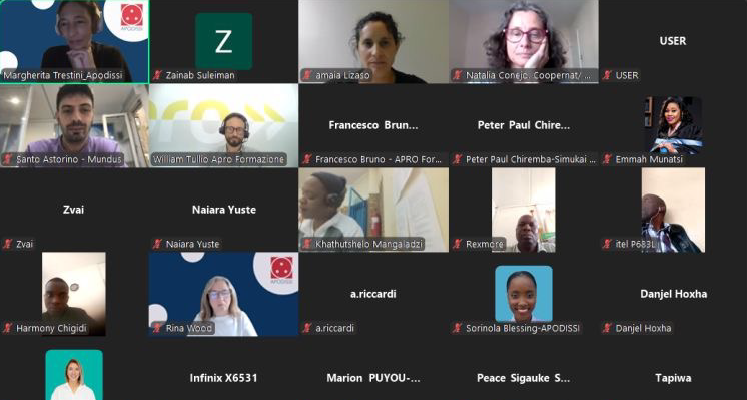
On June 26, 2025, SUSTAIN-IT hosted an online expert session aimed at engaging TVET (Technical and Vocational Education and Training) institutions across Africa, extending beyond the SUSTAIN-IT partnership. The purpose of the session was to share best practices and existing green and digital education programs that could enhance the pedagogical skills of youth in the field of environmental monitoring. The session covered a range of topics related to the green transition and showcased best practices from several Erasmus+ funded projects. Notably, the session attracted over 100 registrants, with more than 60 participants attending.
It begins with a brief introduction to the project by Ms. Margherita Trestini, General Manager of Apodissi. She clearly outlined the projects Objectives: to provide solutions for environmental problems, foster inclusion and entrepreneurship, and co-create job opportunities for Africa. She emphasized the importance of environmental education across all sectors in promoting critical thinking and driving innovative solutions to environmental challenges.
William Domenico Tullio, Head of Formazione at Apro, a TVET school in Italy shared insights into the APRO model, which supports students’ awareness of environmental sustainability. He highlighted examples such as the Green Decalogue and rooftop vertical hydroponic gardens, which are integrated into existing courses to promote ecological consciousness and sustainable practices.
Advancements in technology are playing a crucial role in enhancing environmental monitoring and protection. Ms Amaia Lizaso, an Environmental Education Teacher at Txorierri, explained how tools like sensors, Arduino boards, GPS, and Google Maps are combined to deliver real-time environmental data. While she acknowledged the challenges in helping students applied these technologies, she stressed the importance of equipping them with the skills to understand and protect their environment.
Ms. Margherita also highlighted various projects across Europe and Africa that support Technical and Vocational Education and Training (TVET) by promoting digitalisation, technology adoption, upskilling, inclusion, job creation, and waste management in Africa. Special recognition goes to Erasmus+ for its substantial contribution to sustainable development efforts, including the SUSTAIN-IT initiative.
The session concluded with Ms. Natalia Conejo Andrés, Sustainability Management Expert at Coopernat, MUNDUS, who presented green practices in TVET. She explained sustainable approaches to waste and resource management, citing the circular economy principle, food and energy sovereignty. Ms. Natalia stressed that understanding designing is crucial to repair, refurbishing, and remanufacturing in a circular economy.